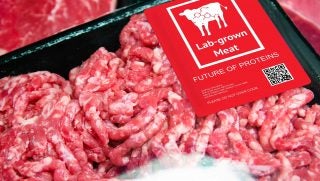Louisiana’s agribusiness industry, fueled by 27,000 farms spanning 8 million acres, is a staple of the state economy. Louisiana fisheries produce 25 percent of the nation’s seafood. Louisiana ports ship 60 percent of America’s grain; and in 2019, agriculture had a $11.7 billion impact on Louisiana’s economy. It’s no wonder the Pelican State takes the future of agribusiness seriously.
Organized in 2020 by Gov. John Bel Edwards, the Resilient Louisiana Commission (RLC) convened leaders from agribusiness and other industries to formulate a COVID-19 recovery plan that wasn’t merely a response to the pandemic, but an actionable plan for future economic prosperity. When farmers, academics, and professionals expressed their views on the state of agribusiness, students were a key part of the conversation.
Six state officers of the Louisiana FFA Association addressed the RLC’s agriculture and rural task forces. They brought attention to many issues, beginning with the need for getting more student and teacher involvement in agriculture.
Elizabeth Richwine, a 2020 graduate of Florien High School in Sabine Parish, says that within three years, 30 percent of the state’s ag teachers will be eligible to retire.
“Not many people are pursuing these jobs,” Richwine says. “The only way we will be able to sustain our world is if we have youth who are committed to the agriculture industry and willing to learn from our leaders.”
Sadie Foster, a senior at St. Amant High in Ascension Parish, says she encouraged task force members to help raise awareness of agriculture among more students. “My goal is making people aware of the opportunities we offer and the skills that we’re building,” Foster says.
Cut Off resident and Nicholls State University freshman Megan Chiasson added, “As leaders in agriculture, we look for opportunities for students, particularly in rural communities: opportunities like going to college and pursuing agriculture in unique ways. Agriculture affects everyone; in the long run it drives our economy.”
The students were invited to address the task force by Eric Smith, Ph.D., of the LSU AgCenter and executive director of FFA’s statewide organization.
Smith regularly participated on the RLC’s ag task force. He said that after the first few meetings, he recognized the panel needed to hear from a younger generation that will face these challenges head-on.
“I realized we needed to hear from these kids. How they’re trained and dispersed across the state lends itself to growing Louisiana and the kind of revitalization we’re talking about on the task force,” he says.
Smith, who spent 14 years as an agriculture teacher in Natchitoches Parish, says task force members needed to understand the importance of FFA and the role it plays throughout the state. FFA provides early training for students who often go on to become civic and political leaders in their rural communities.
“FFA gives them a chance to develop confidence with things like public speaking and how to use parliamentary procedure,” Smith says. “These are the kinds of skills they’ll need to run for office or serve on boards, and have an opportunity to stay in their communities.”
He acknowledged the student observations on raising awareness of the careers available through agriculture.
“Part of our goal is to prepare students for the jobs that we have discussed and will continue to discuss,” says Foster, the St. Amant High student.
“We’re all very passionate about the agriculture industry and food industry, and we want to ensure high-quality education and opportunities for jobs,” says Haley Faciane, a Ponchatoula High School graduate and freshman at LSU.
From a multibillion-dollar forestry sector to cotton, rice, soybeans, livestock, sugar cane and more, Louisiana is gifted with tremendous natural resources. The input of FFA members will guide leaders like the Resilient Louisiana commissioners as they protect and support the future of agribusiness. Louisiana’s comprehensive plan will help ensure economic success now and throughout future generations of farmers.


